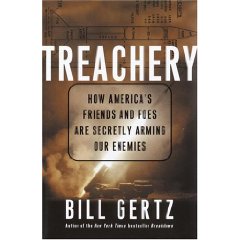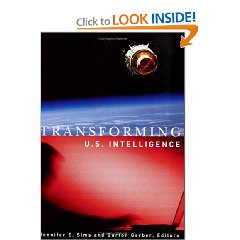There are three major scoops in this book that earn it five stars where the rest of the book might only merit four:
1) The obvious scoop now before Congress and the press, with respect to the National Security Agency (NSA) eavesdropping on citizens without a warrant.
2) The really really huge scoop, that Charlie Allen, then Deputy Director of Central Intelligence for Collection, was able to guide the recruitment of no fewer than 30 Iraqis able to travel back to see their relatives and conclusively document that there was no nuclear program and no weapons of mass destruction–this information was evidently not provided to Congress, the President, or (naturally), the public.
3) Slightly less sensational, the book reveals for the first time that a CIA “bait” operation actually delivered to Iran completely useful plans for creating a nuclear bomb…the CIA “flaws” intended to render the plans unworkable were detected in one glance by a Russian courier scientist, and easily correctable by the Iranians.
Over-all the book renders an important public service by pulling together in one place the many tid-bits that are publicly known, but is distressingly weak on crediting those many other sources (e.g. Jim Bamford, the last word on NSA).
The cover of the book is quite revealing in that it has photos of Bush, Rumsfeld, Rice, and Tenet–those who follow the politics of the Executive know that Cheney is the man pulling the puppet strings, generally without being detected, and it is Cheney that allowed Rumsfeld to blatantly ignore the President, steam-roll Condi Rice, disrespect Tenet, and sideline Colin Powell.
Other major points in the book that merit our attention and respect:
1) According to the author, but consistent with my own experience across three three of CIA's directorates, CIA consistently screws those that try to tell the truth, such as the Chief of Station in Iraq that wrote the report saying the insurgency was going to hurt us badly and we were not winning.
2) CIA developed a “poisonous culture” that sought to mollify the President, avoid conflict with the Pentagon, and generally not be serious about its mission {“ye shall know the truth and the truth shall make you free”)
3) CIA did not blow the whistle on the ramping up of Afghan drug production, and allowed the Pentagon to ignore the urgent calls from the Department of State for aerial spraying and other eradication measures–today Afghanistan provides 80% of the opium on the market.
4) Israel's Mossad briefed the neo-conservatives along lines they were pleased to hear, going around and against the CIA.
There are several minor flaws in the book that would normally reduce my appreciation to four stars, but the above scoops more than compensate. However, they are worth noting:
1) The book seriously over-sells and exaggerates NSA's capabilities. While they can indeed do some wondrous things, on balance NSA is in the 1970's and not at all ready for the modern world of emails, web directories, and phone texting.
2) The book touches on New York Times stories based on “leaks” from the White House but avoids naming Judith Miller or exploring whether she was an Israeli agent of influence.
3) The book touches on torture and rendition, but does not discuss how many have been imprisoned erroneously (in the dozens according to some accounts) or died as a result of torture (as many as two dozen according to some accounts). CIA literally made people “disappear” making it no better than the Argentines or the Israelis or the Nazis. Most of CIA is honest; a small segment engaged in torture and renditions is out of control.
4) The book supports the CIA field claims that the Northern Alliance allowed Bin Laden to escape, but fails to mention the well-documented facts that Secretary of Defense Rumsfeld, without consulting anyone, gave the Pakistanis an air corridor, ostensibly to evacuate a few of their “observers,” that was used to actually evacuate over 3,000 Taliban and Al Qaeda personnel trapped by US forces in the Tora Bora area; and that CIA tracked Bin Laden for four days from Tora Bora to the Waziristan border, but the Pentagon was too chicken to drop a battalion of Rangers in his path (see my review of “JAWBREAKER.”
5) The book comments on the 9-11 Commission being contradicted by open records in many respects, but fails to examine the close relationship between the White House, the Bush Family, and the Saudis, who were complicit in Al Qaeda's global growth and unwilling to help the US until after 9/11 and even then, very marginally.
6) The book has a highly questionable allegation that a single error by a CIA communicator “blew” all CIA Iranian assets. My understanding is that the CIA has been equally incompetent in recruiting Iranians as it was in recruiting Iraqis. This smells like a fish story.
Over-all the book delivers two compelling indictments:
1) Of CIA for self-censorship, pandering to the President and the Vice President, and failing to cover the Middle East properly over a period of decades.
2) Of Cheney and Rumsfeld, for orchestrating a virtual coup in which the President could be ignored, the National Security Advisor steam-rolled, the Secretary of State side-lined, and the entire policy process set aside in favor of Cheney-Rumsfeld dictates.
This is quite an amazing book, and highly recommended.
NOTE TO SCEPTIC: I bought this book from Amazon as soon as it was offered, read it on an airplane to Los Angeles on 10 Jan, and posted my review along with those of three other books I read on the trip, the evening I returned, 13 January. I read a lot, mostly on airplanes and hotel rooms. I put my notes on the flyleaf and mark the books up heavily.









